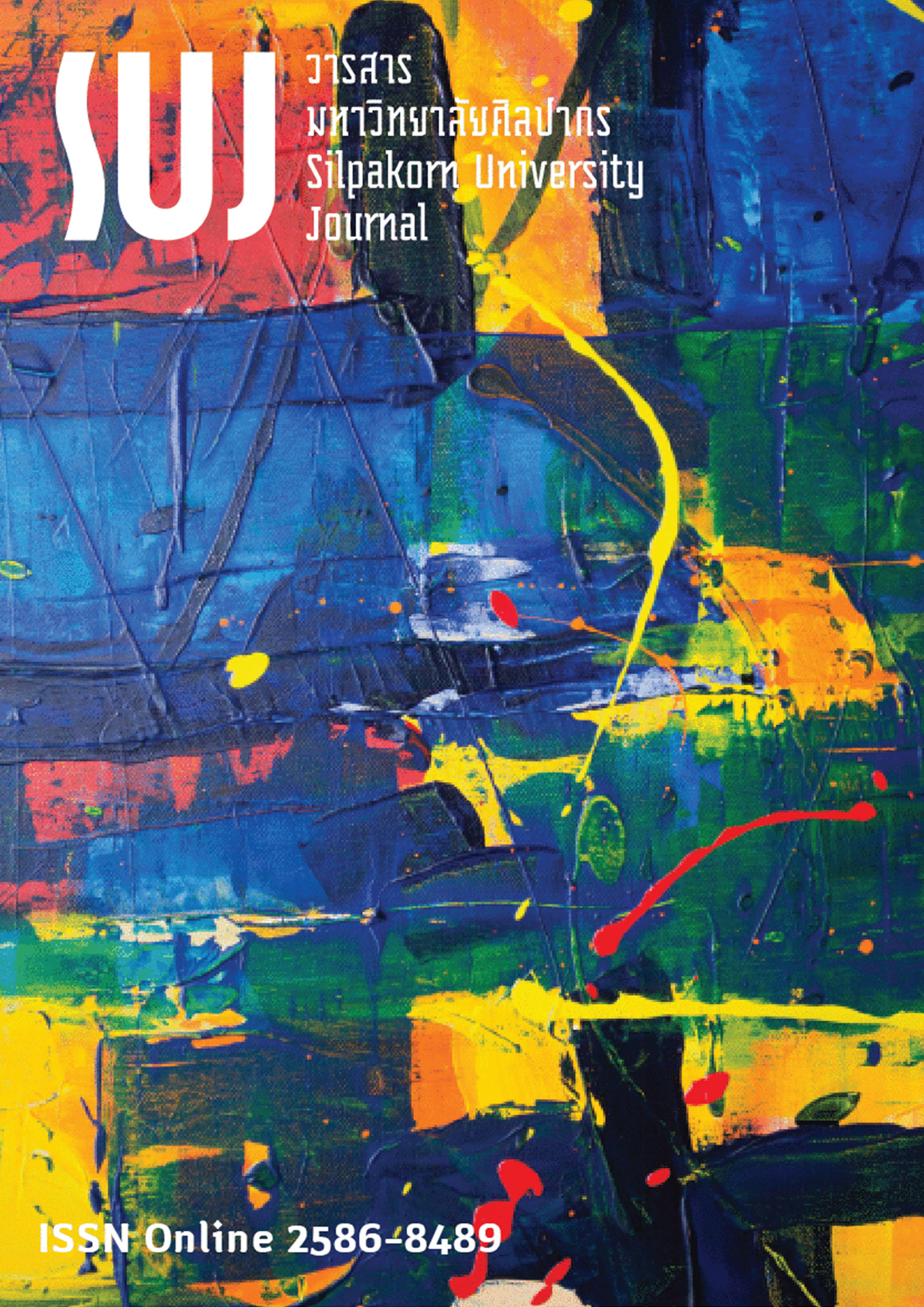การพัฒนาบริบทการทำงานเพื่อเพิ่มพูนสมรรถนะของนักเรียนในการเรียนประวัติศาสตร์ (Workplace context development for enhancing students’ competencies in learning history)
Main Article Content
Abstract
การพัฒนาบริบทการทำงานเพื่อเพิ่มพูนสมรรถนะของนักเรียนในการเรียนประวัติศาสตร์ เกิดขึ้นเนื่องจากประเทศไทยประสบปัญหาเรื่องคุณภาพนักเรียนที่ไม่สามารถนำความรู้ ทักษะที่เรียนรู้ไปประยุกต์ใช้ในการทำงานและการดำรงชีวิตประจำวันได้ ผู้วิจัยจึงมีความสนใจที่จะพัฒนาบริบทการทำงานเพื่อเป็นคลังงานสำหรับครูได้นำไปใช้เพื่อพัฒนาสมรรถนะในการทำงานให้กับผู้เรียนในการเรียนประวัติศาสตร์ ประเมินบริบทการทำงานโดยผู้ทรงคุณวุฒิ และศึกษาการวางแผนของครูในการนำบริบทการทำงานที่สร้างขึ้นไปใช้ในการจัดการเรียนการสอนของตน จากการดำเนินการวิจัยได้ผลการออกแบบและพัฒนาบริบทการทำงานในการเรียนประวัติศาสตร์ ระดับประถมศึกษา (ประถมศึกษาปีที่ 1-6) ที่สอดคล้องเชื่อมโยงกับมาตรฐานการเรียนรู้ ตัวชี้วัด ประวัติศาสตร์ ในหลักสูตรแกนกลางการศึกษาขั้นพื้นฐาน พุทธศักราช 2551 โดยในภาพรวมผู้ทรงคุณวุฒิเห็นด้วยว่า มีคุณภาพในระดับมาก และครูทุกคนสามารถนำบริบทงานไปประยุกต์ใช้ในแผนการจัดการเรียนรู้ของตนได้
This research on workplace context development for enhancing students’ competencies in learning history was aimed at finding a solution to the problem that history students in Thailand cannot apply their knowledge to their work in real life. The research developed a model for workplace context improvement for history teachers using experts’ evaluations of workplace contexts and studies of teachers’ plans to apply the created models in their teachings. As a results, this research created a design to improve workplace contexts for history learning of the elementary level (Grade 1 - Grade 6). The design is aligned with the history content standards and the indicators for the Basic Education Core Curriculum B.E. 2551. In an overview, the experts agreed on the high quality level, and it was proved that every teacher could apply the designed workplace contexts with their instructional plans.
Downloads
Article Details

This work is licensed under a Creative Commons Attribution-NonCommercial-NoDerivatives 4.0 International License.
References
Benner, P. (1984). From Novice to Expert: Excellence and Power in Clinical Nursing Practice. The American Journal of Nursing, 84(12): 1480.
Bristow, S. F., & Patrick, S. (2014). An International Study in Competency Education: Postcards from Abroad. [Online]. Retrieved October 6, 2020 from https://aurora-institute.org/wp-content/uploads/CW-An-International-Study-in-Competency-Education-Postcards-from-Abroad-October-2014.pdf
Brooker, R., & Butler, J. (1997). The Learning Context within the Workplace: As Perceived by Apprentices and Their Workplace Trainers. Journal of Vocational Education and Training, 49(4): 487-510.
Chomchuen, Yuvadee. (2018). The Development of History Learning through Historical Method, Blended Learning and Collaborative Learning for Matthayomsuksa II Students (การพัฒนารูปแบบการจัดการเรียนรู้ประวัติศาสตร์โดยประยุกต์ใช้วิธีการทางประวัติศาสตร์การเรียนรู้แบบผสมผสาน และการเรียนรู้แบบทำงานร่วมกันสำหรับนักเรียนชั้นมัธยมศึกษาปีที่ 2). Journal of Education Research Faculty Education, Srinakharinwirot University, 13(2): 137-151.
Tiravanitchakul, Rattinan, & Nillapun, Maream. (2013). A Development of Competencies, Indicators for Competencies of Bachelor’s Degree Students in Communication Disorders Program (การพัฒนา-สมรรถนะ ตัวชี้วัดสมรรถนะบัณฑิตสาขาวิชาความผิดปกติของการสื่อความหมาย). Silpakorn Educational Research Journal, 7(1): 84-96.
Havekes, H. (2015). Knowing and Doing History. Learning historical thinking in the classroom. Doctoral dissertation, Radboud University, Nijmegen, Netherlands.
Lee, T., Fuller, A., Ashton, D., Butler, P., Felstead, A., Unwin, L., & Walters, S. (2004). Learning as Work: Teaching and Learning Processes in the Contemporary Work Organisation. [Online]. Retrieved September 14, 2020 from https://www.academia.edu/31330082/Learning_as_Work_Teaching_and_Learning_Processes_in_the_Contemporary_Work_Organisation
McClelland, D. C. (1973). Testing for Competence Rather than for “Intelligence”. American Psychologist, 28(1): 1-14.
McLagan, P. A. (1997). Competencies: The Next Generation. Training & Development Journal, 51(5): 40-47.
Office of the Basic of Education. (2019). Students’ Core Competency Determination in the Basic Level Education (การกำหนดสมรรถนะหลักของผู้เรียนระดับการศึกษาขั้นพื้นฐาน). Bangkok: 21 Century.
Office of the Education Council. (2019). Learning Management for Competency-Based Active Learning (การจัดการเรียนรู้ ฐานสมรรถนะเชิงรุก). Bangkok: 21 Century.
Rozhkov, M., Cheung, B. C. F., & Tsui, E. (2017). Workplace Context and its Effect on Individual competencies and Performance in Work Teams. International Journal of Business Performance Management, 18(1): 49.
Russo, D. (2016). Competency Measurement Model. [Online]. Retrieved September 12, 2020 from https://www.ine.es/q2016/docs/q2016Final00276.pdf
Spencer, L. M., & Spencer, S. M. (1993). Competence at Work: Models for Superior Performance. New York: John Wiley & Sons Inc.
Thongkeaw, Tuen. (2007). Competency: Principles and Methods (สมรรถนะ (Competency): หลักการและแนวปฏิบัติ). Bangkok: Suan Dusit Rajabhat University.


